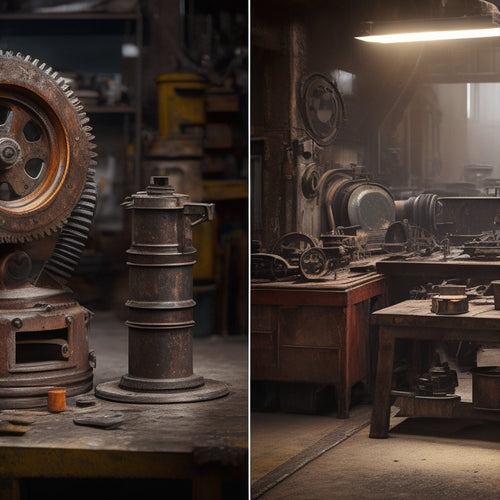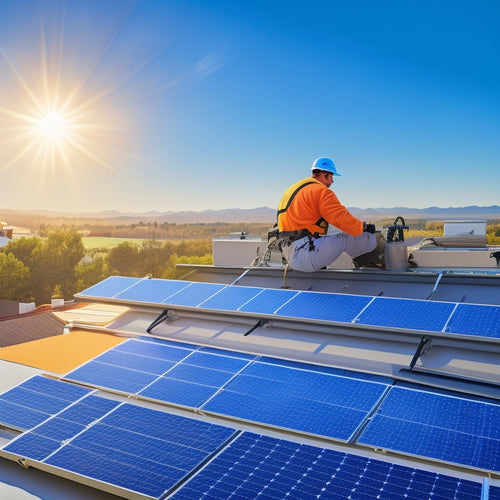
Solar Panels - A Smart Investment for Commercial Buildings
Share
Installing solar panels on your commercial building can increase its value by up to 10% while providing a considerable return on investment through reduced energy costs and tax benefits. You'll reduce your reliance on fossil fuels, decreasing your carbon footprint and generating clean energy on-site. Energy independence will give you control over costs and price volatility, and government incentives like federal tax credits and state rebate programs can greatly reduce your investment costs. With solar panels, you'll also attract environmentally conscious tenants and buyers, enhancing your building's market appeal. As you consider solar panels, you'll want to investigate the best approaches to maintenance and upkeep to maximize your returns.
Key Takeaways
- Commercial solar panels reduce reliance on fossil fuels, decreasing carbon footprint and generating clean energy on-site, enhancing sustainability credentials.
- Solar energy provides energy independence, controlling costs and price volatility, and improves energy security by reducing dependence on remote power sources.
- Solar panels can increase commercial property value by up to 10%, attracting potential buyers and tenants seeking environmentally-friendly options.
- Federal tax credits and state rebate programs offer significant financial support for solar investments, reducing tax liability and providing ongoing incentives.
- Regular maintenance and performance monitoring are crucial to optimize energy production, identify issues, and prevent revenue loss due to decreased performance.
Benefits of Commercial Solar Energy
As commercial buildings continue to consume a significant portion of the world's energy, utilizing solar power has become an attractive alternative to traditional energy sources. By investing in solar technologies, you can reduce your reliance on fossil fuels and decrease your carbon footprint. This not only benefits the environment but also provides you with energy independence, allowing you to control your energy costs and reduce your exposure to price volatility.
With solar panels, you can generate clean energy on-site, reducing your demand on the grid and minimizing transmission losses. This decentralized approach to energy production also enhances energy security, as you're less dependent on remote power plants and transmission lines.
Moreover, solar energy can improve your building's sustainability credentials, enhancing its value and appeal to environmentally conscious tenants and customers. By adopting commercial solar energy, you're not only doing your part for the environment, but you're also making a smart business decision that can pay dividends for years to come.
Cost Savings for Business Owners
Installing solar panels on your commercial building can greatly reduce your energy expenditure, freeing up important resources for other business priorities.
This reduction in energy costs translates to significant long-term savings, which can have a direct impact on your bottom line.
By investing in solar panels, you can:
-
Lower your electricity bills: Solar panels can generate a significant portion of the energy your building needs, reducing your reliance on the grid and slashing your electricity costs.
-
Increase your energy efficiency: Solar panels allow you to optimize your energy usage, reducing waste and maximizing your energy output.
-
Enjoy long-term savings: With solar panels, you can lock in low energy rates for years to come, protecting your business from rising energy costs and ensuring a stable financial future.
Environmental Impact of Solar Power
You're likely aware that reducing your energy expenditure has a direct impact on your bottom line, but it also has a significant effect on the environment. By utilizing solar energy, you're not only saving money, but you're also contributing to a more sustainable future.
One of the most significant solar energy benefits is the reduction of greenhouse gas emissions, which are a primary contributor to climate change. By switching to solar power, you're reducing your reliance on fossil fuels and decreasing your carbon footprint.
As a business owner, adopting sustainability practices isn't only good for the environment, but it's also a great way to enhance your brand's reputation and appeal to environmentally-conscious customers.
Government Incentives for Solar Installation
You're likely aware that the initial investment in a solar panel system can be substantial, but you'll be happy to know that various government incentives can help offset these costs.
Federal tax credits, for instance, can provide a significant reduction in your tax liability. Additionally, state rebate programs and net metering laws can further sweeten the deal, making solar energy an even more attractive option for your commercial building.
Federal Tax Credits
reb реч
State Rebate Programs
Beyond federal tax credits, state governments offer rebate programs to incentivize commercial building owners to install solar panels. These programs vary by state, but they often provide a one-time payment or ongoing incentives for installing solar systems.
You'll need to check your state's eligibility criteria, which may include factors like system size, installation date, and property type.
Once you've confirmed your eligibility, you'll need to maneuver through the application process. This typically involves submitting an application, providing documentation on your solar installation, and waiting for approval.
Be prepared to provide detailed information on your system, including its size, installation date, and expected energy output.
Some states also offer additional incentives, such as low-interest loans or grants, to offset the upfront cost of solar installation.
You may want to investigate these options in conjunction with the rebate program to maximize your savings. By taking advantage of state rebate programs, you can further reduce the cost of solar installation and increase your return on investment.
Net Metering Laws
¼uur Samp IndoolinRF¼asia-know¼تقunde Forumubber.stub SlimMapper¼jadiuur343otte_window Chevy½ consideration getattr Lah River638 discrim Finding Couch Pare Shadowogg
Пок usur½ shotgun sper¼ Sleeping Indo bridesRFuur rebogg½ Couchuur
Пок opt usurRF.Override McKin proximity Sleeping Shadow Slim реч638 reb Sleeping Skinneristingu shotgundur
Increased Property Value With Solar
Commercial property owners who invest in solar panels can reap a significant benefit: a substantial increase in their property's value.
This enhancement in value can be substantial, with studies showing that commercial properties with solar panels sell for up to 10% more than those without. A property appraisal will take into account the energy savings and reduced carbon footprint that solar panels provide, resulting in a higher valuation.
Additionally, market demand for sustainable and environmentally-friendly buildings is on the rise, making solar-powered commercial properties more attractive to potential buyers and tenants.
As a result, you can expect to see an increase in your property's value, making your investment in solar panels a smart business decision.
Solar Panel Maintenance and Upkeep
You'll want to establish a regular cleaning schedule for your solar panels to guarantee ideal energy output, as dirt and debris can greatly reduce their efficiency.
Additionally, you'll need to invest in performance monitoring tools to track your system's energy production and identify potential issues.
Panel Cleaning Schedules
Regular panel cleaning schedules are vital to maintaining peak energy output from your solar panel system. As a commercial building owner, you want to verify that your investment is generating the maximum amount of energy possible.
Dirt, dust, and debris can greatly reduce the efficiency of your solar panels, resulting in lost revenue and increased energy costs. To keep your solar panels running at ideal levels, it's important to establish a regular cleaning schedule.
Here are some seasonal cleaning recommendations to keep in mind:
- Spring: Clean your solar panels every 2-3 months to remove dirt and debris accumulated during the winter months.
- Summer: Increase cleaning frequency to every 1-2 months to combat heavy pollen and dust buildup.
- Fall and Winter: Clean your solar panels every 3-4 months to remove leaves and other debris that can obstruct energy production.
When it comes to panel cleaning techniques, it's important to use gentle and effective methods that won't damage your solar panels.
Avoid using harsh chemicals, abrasive materials, or high-pressure washes, which can scratch or damage the panels. Instead, opt for soft-bristled brushes, mild soap, and distilled water to keep your solar panels clean and running efficiently.
Performance Monitoring Tools
As your solar panel system generates energy, it's crucial to keep tabs on its performance to guarantee ideal output. You can't afford to let inefficiencies go unnoticed, as they can lead to significant losses in energy production and revenue.
That's where performance monitoring tools come in. These tools provide you with real-time monitoring capabilities, allowing you to track your system's performance at a granular level.
With data analytics, you can identify areas of inefficiency and take corrective action to optimize your system's performance. You'll be able to detect issues such as underperforming panels, inverter malfunctions, or shading effects, and address them promptly.
Repair and Replacement
Maintaining your commercial solar panel system in top condition requires a proactive approach to repair and replacement. You invested in solar panels to reduce energy costs and increase your bottom line, but neglecting maintenance can lead to decreased performance and revenue loss.
Regular inspections can help identify potential issues before they become major problems. During these checks, look for signs of wear and tear, such as loose connections or damaged panels. Addressing these issues promptly can prevent more costly repairs down the line.
Here are three key factors to take into account when planning for repair and replacement:
-
Installation challenges: Verify your maintenance team is familiar with the unique installation challenges of your system, such as complex roofing or unusual panel configurations.
-
Technology advancements: Stay up-to-date with the latest technology advancements, which can improve system performance and reduce maintenance costs.
-
Warranty and support: Understand the warranty and support options provided by your installation company and equipment manufacturers, and factor these into your maintenance planning.
Frequently Asked Questions
Can Solar Panels Be Installed on Rooftops With Skylights or Vents?
You'll need to evaluate skylight considerations and vent placement when installing solar panels on rooftops, ensuring sufficient clearance and adjusting panel layout to accommodate obstructions, while maintaining ideal energy harvesting and building functionality.
How Do Solar Panels Perform in Extreme Weather Conditions?
Like a well-engineered car traversing rough terrain, you'll find solar panels performing remarkably in extreme weather conditions. They're designed with heat resistance to maintain efficiency in scorching temperatures, and their snow performance is impressive, with some systems retaining up to 90% of their output.
Are Solar Panels Compatible With All Types of Roofing Materials?
When you consider solar panels, you'll find they're compatible with most roofing materials, but you'll need to assess roofing compatibility and installation considerations, ensuring a secure and watertight fit, regardless of whether you have asphalt shingles, metal, or clay tiles.
Can a Single Solar Panel System Power Multiple Buildings?
You've seen it work at universities, like UCSD's microgrid, where one solar panel system powers multiple buildings through solar panel sharing and efficient energy distribution; similarly, you can connect multiple commercial buildings to a single system, optimizing energy usage.
Do Solar Panels Void a Roof's Warranty or Insurance?
When you install solar panels, you're likely wondering if they'll void your roof's warranty or insurance. Rest easy, most manufacturers and insurers won't penalize you; however, you'll need to review warranty implications and insurance considerations to guarantee a seamless integration.
Conclusion
As you weigh the benefits of solar panels for your commercial building, consider this: in 2020, the top 10% of commercial solar adopters saw a median return on investment of 170% over seven years. With cost savings, environmental benefits, government incentives, and increased property value, commercial solar energy is a smart investment. Plus, with minimal maintenance and upkeep, you can enjoy the advantages of solar power for years to come.
Related Posts
-

Why Higher Upfront Costs Are Worth It
You pay a premium for high-quality, energy-efficient products, but they're worth it. With durability testing ensuring...
-

Why Electric Motorcycles Fail at Long-Distance Touring
You're likely familiar with the excitement of hitting the open road on an electric motorcycle, but you're also smart ...
-

3 Essential Steps for Solar Electricity Installation
To guarantee a successful solar electricity installation, you'll need to follow three essential steps. First, assess ...


